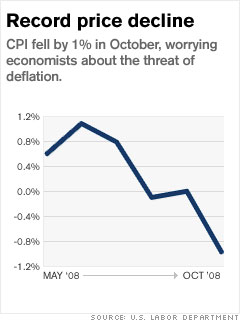
That may sound like a nice change of pace, but deflation generally coincides with a severe contraction in the economy as consumers and businesses freeze their spending (why buy something if it will be cheaper down the road?)
For now, the threat is still remote: Though down in October, prices as measured by the Consumer Price Index were still up 3.7% from a year ago.
The CPI is issued each month by the government's Bureau of Labor Statistics and measures the change in a hypothetical shopping cart, which includes what a typical family might spend money on each month - everything from a gallon of gas and a box of cereal, to rent and doctors' visits. To make the hypothetical cart useful, the BLS has surveyed thousands of families on their actual spending habits.
NEXT: Home prices: Falling faster
Last updated December 08 2008: 12:48 PM ET
